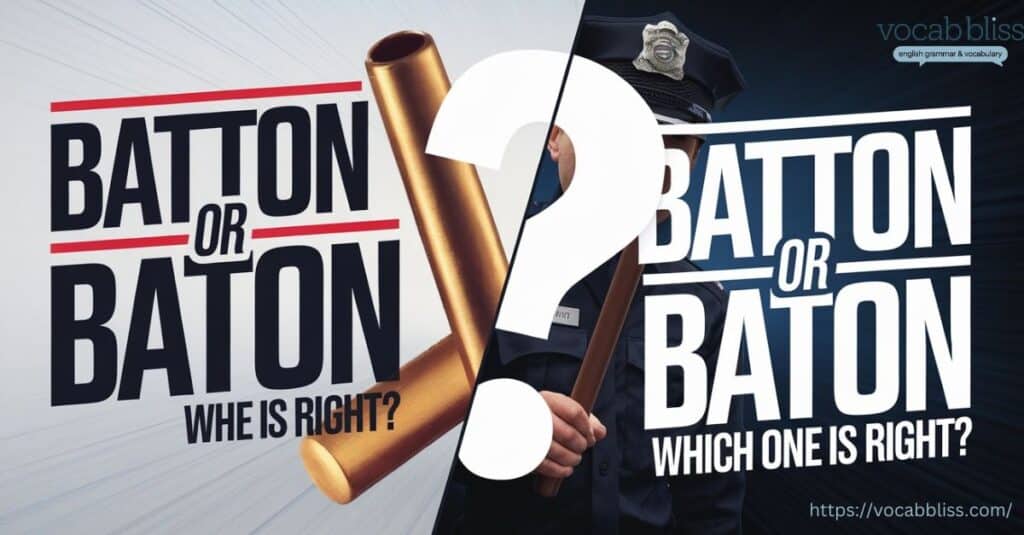If you’ve ever been puzzled over whether to use “batton or baton,” you’re not alone. These two words sound nearly identical but only one is correct. Spoiler alert: the word “baton” is right, while “batton” is a spelling mistake.
This article dives into the differences, origins, and uses of “baton”; as a result, you’ll never mix them up again.
Quick Summary
In conclusion, the word “baton” is the correct spelling for a variety of tools and symbols used across different fields, including sports, music, and law enforcement. While “batton” is a common misspelling, it has no accepted meaning or usage in standard English. A baton is most commonly seen in relay races, where it is passed between runners, in music, where conductors use it to guide orchestras, and in law enforcement, where officers carry it as a tool for self-defense. The word’s pronunciation varies slightly between regions, but buh-TAHN is the most common in American English. Understanding the proper spelling and usage of “baton” ensures clarity in both writing and speech.
Discover more: Attornies or Attorneys: Which version is correct?
Understanding Baton or Batton
The difference between “Baton or Batton” lies in spelling accuracy and real-world usage. While “baton” is a legitimate and widely used English word, “batton” is a misspelling with no recognized meaning. Let’s break it down for better clarity.
What Is Batton?
“Batton” is not an official word in the English language. It is often mistakenly written this way due to common spelling patterns involving double consonants, such as “button” or “cotton.” Despite this, “batton” is considered incorrect in every context.
- Why It’s Incorrect: English doesn’t support “batton” as a valid term. Its frequent misuse stems from overgeneralizing double-letter spelling conventions.
- Occurrences: You might see “batton” in informal settings, casual writing, or online discussions, but it holds no legitimate meaning or application.
What Is Baton?
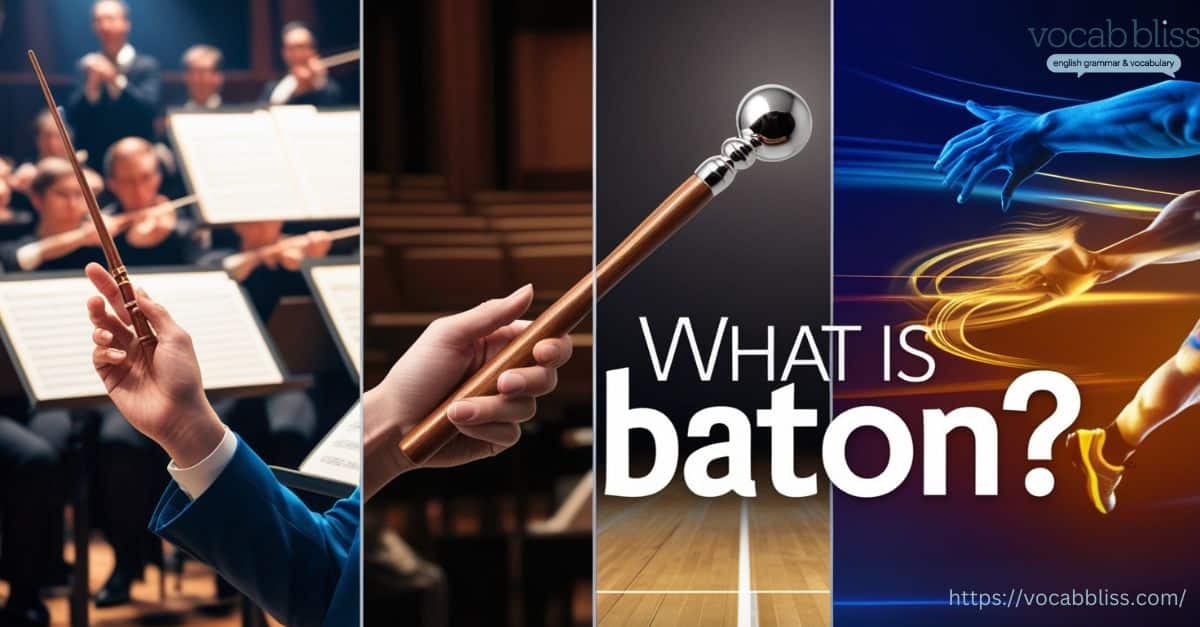
The word “baton” is a versatile noun with significant applications across sports, music, and law enforcement. Additionally, it derives from the French word bâton, meaning stick or staff, and has been incorporated into English for centuries.
- Definition: A baton is a lightweight rod or stick used for specific purposes, such as conducting music, passing during a relay race, or as a tool in law enforcement.
- Common Uses:
- In relay races, athletes pass a baton to their teammates.
- In orchestras, conductors use a baton to guide musicians.
- Police officers carry batons for defense or crowd control.
- Importance: The word “baton” has cemented its place in modern language due to its functionality and versatility.
By understanding these distinctions, it becomes clear that “baton” is the correct spelling, and therefore, it is the one you should always use.
Common Uses of Baton
The word “baton” is incredibly versatile, with applications spanning multiple fields. For example, from sports to music and law enforcement, the baton has specific purposes and meanings that make it a valuable tool in each context. Additionally, each use highlights its unique role, showcasing how important it is in various settings. Now, let’s explore its common uses:
Baton in Sports

In sports, the baton plays a pivotal role, particularly in relay races.
- Relay Races:
- A baton is a lightweight, hollow cylinder passed between teammates during a relay race.
- The successful transfer of the baton is crucial to a team’s performance. A dropped baton can lead to disqualification, making precision and coordination vital.
- Example: “The runner stretched her arm backward, ensuring her teammate grabbed the baton without breaking stride.”
- Specifications:
- Material: Batons are typically made of lightweight aluminum or plastic.
- Dimensions: According to track and field regulations, a baton must be 28-30 cm long and weigh no more than 50 grams.
- Symbolism: In relay races, the baton symbolizes teamwork, as each runner relies on the others to carry it to the finish line.
Baton in Music
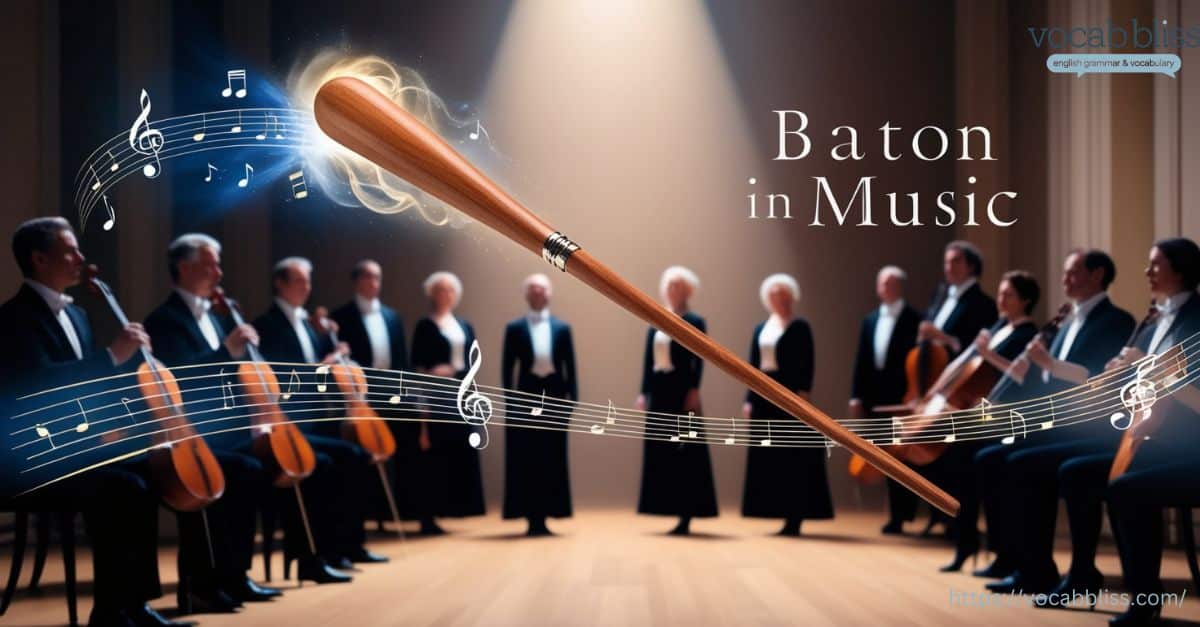
In the world of music, the baton, therefore, serves as a conductor’s essential tool.
- Orchestra Conducting:
- Conductors use batons to visually signal tempo, dynamics, and cues to musicians.
- The baton ensures synchronization among various sections of an orchestra, from strings to percussion.
- Example: “With a flick of his baton, the conductor brought the orchestra to a soaring crescendo.”
- Design and Features:
- Material: Batons are often made from wood, fiberglass, or carbon fiber.
- Length: Typically 12-16 inches, chosen based on the conductor’s preference and the size of the ensemble.
- Balance: The handle, often cork or rubber, provides grip and comfort for long performances.
- Cultural Significance: The baton has become a symbol of leadership and artistry in musical performances.
Baton in Law Enforcement
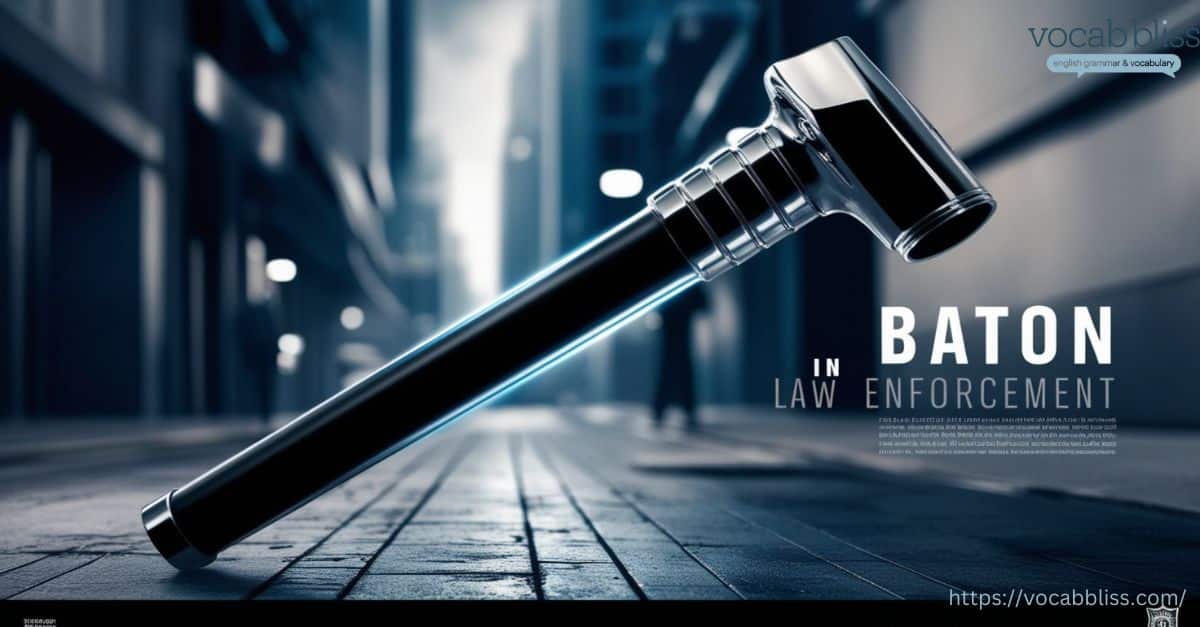
In law enforcement, the baton serves as a tool for protection and crowd management.
- Police Equipment:
- Police officers and security personnel carry batons as non-lethal weapons for self-defense or to subdue suspects.
- They are often used during crowd control operations or to de-escalate tense situations.
- Example: “The officer used her baton to deflect an oncoming threat without resorting to lethal force.”
- Types of Batons:
- Straight Baton: A traditional design, often made of hardwood or polycarbonate.
- Expandable Baton: Compact and portable, it extends with a flick of the wrist, making it popular among modern law enforcement.
- Side-Handle Baton: Features a perpendicular grip for added control.
- Regulations: The use of batons is governed by strict protocols to ensure they are employed responsibly and ethically.
Baton in Ceremonial Contexts
Beyond practical uses, batons hold symbolic value in ceremonial events:
- Parades and Performances: Drum majors in marching bands use batons to lead performances. These are often elaborately decorated for visual appeal.
- Leadership Symbols: In military or formal ceremonies, batons are sometimes carried as emblems of authority.
- Example: “The drum major’s baton, adorned with gold accents, reflected the sun as he led the parade.”
Other Uses of Baton
The word “baton” also appears metaphorically in idiomatic expressions:
- Passing the Baton: This phrase symbolizes handing over responsibility or leadership. It’s commonly used in professional and personal contexts.
- Example: “After years of running the business, the CEO passed the baton to her successor.”
Why Do People Confuse Batton or Baton?
The confusion stems primarily from English spelling quirks. Words like “button” or “cotton” feature double “t”s, leading many to mistakenly “spell baton” as “batton.” However, no such rule applies to this word. The correct spelling remains “baton.”
Side-by-Side Comparison of Batton or Baton
To clearly distinguish between “Baton or Batton,” let’s first compare their spelling, pronunciation, meaning, and usage. This comparison, in turn, highlights why “baton” is the correct word, while “batton” is simply a common misspelling.
| Aspect | Batton | Baton |
|---|---|---|
| Spelling | Incorrect spelling | Correct spelling |
| Pronunciation | Not applicable; no recognized usage | Pronounced buh-tawn or buh-ton |
| Definition | No official meaning | A stick used in sports, music, or law enforcement |
| Origin | None | Derived from the French word bâton |
| Contexts of Use | Frequently seen as a spelling error | Widely used in sports, music, law enforcement, and more |
| Examples in Sentences | “She accidentally wrote ‘batton’ instead of ‘baton’.” | “The conductor raised his baton to begin the symphony.” |
| Symbolism | None | Symbolizes teamwork, leadership, and authority |
Key Takeaways:
- “Batton” is always incorrect and arises from common spelling mistakes.
- “Baton” is the correct term, used in many real-world contexts, including sports, music, and law enforcement.
Understanding this side-by-side comparison not only clarifies the difference but also ensures you’re confident in choosing the correct word, “baton,” in every situation.
Everyday Usage Examples Batton vs Baton
To solidify your understanding, here are some practical examples of how do you spell baton
- Sports: “The athlete passed the baton during the final stretch of the relay.”
- Music: “The maestro’s baton guided the orchestra through a flawless performance.”
- Law Enforcement: “The officer used her baton to diffuse a dangerous situation.”
Pronunciation of Baton
The pronunciation of the word “baton” can vary depending on regional accents, context, and usage. Below are the most common pronunciations to help you sound confident when using this word in different scenarios.
Batton vs Baton Pronunciations in Detail
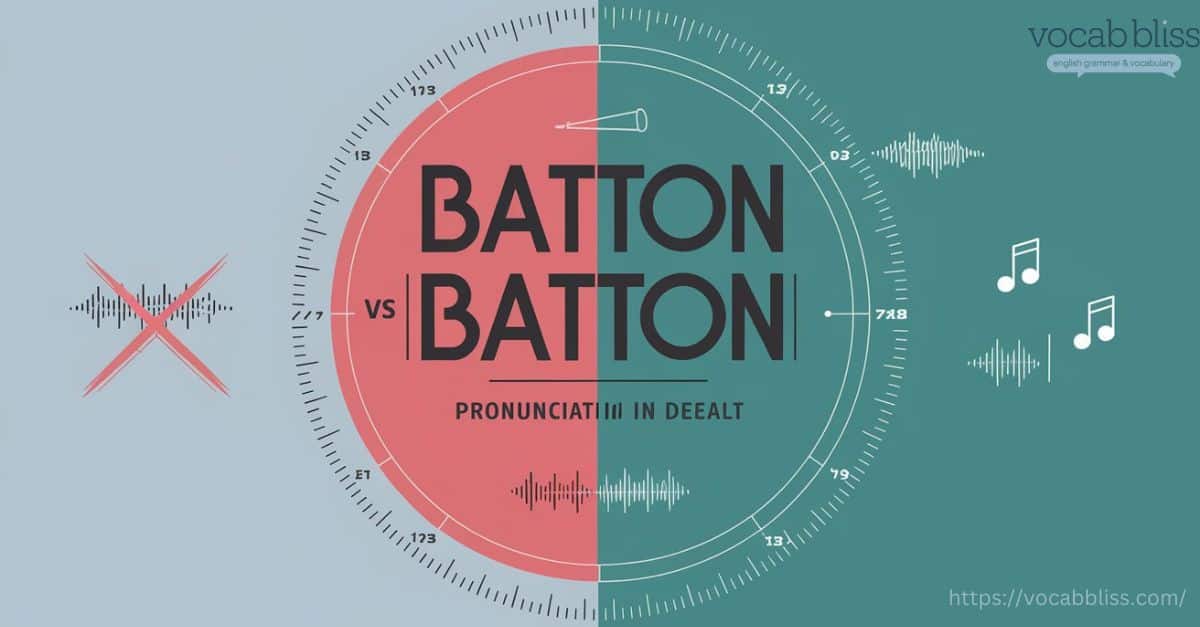
- British English:
- Pronounced as /ˈbæt.ən/ or /ˈbæt.ɒn/
- Sounds like: BAT-un or BAT-on.
- Example: “The conductor raised his BAT-un before the orchestra began.”
- American English:
- Pronounced as /bəˈtɑːn/ or /bəˈtɒn/
- Sounds like: buh-TAHN or buh-TON.
- Example: “The relay runner smoothly passed the buh-TAHN to her teammate.”
Common Usage Variations
- In sports contexts (like relay races), the pronunciation often aligns with buh-TAHN in both British and American English.
- In music contexts (like conducting), both buh-TAHN and BAT-un are acceptable.
- In law enforcement contexts, the pronunciation tends to lean towards buh-TAHN in American English.
Audio Pronunciation Examples
If you’re unsure , you can use tools like Merriam-Webster or Cambridge Dictionary to hear audio pronunciations of “baton.”
Fun Fact: Why Does Pronunciation Vary?
The word “baton” originates from the French word bâton, pronounced as /ba.tɔ̃/ (bah-TON), meaning a stick or staff. This French influence explains why many English speakers retain the softer buh-TAHN pronunciation, especially in formal or professional settings.
Key Tip:
Both buh-TAHN and BAT-un are widely accepted pronunciations. Choose the one that aligns with your region and context, and you’ll always sound correct!
Fun Facts About Baton
- Historical Roots: The baton originated in ancient times as a symbol of authority.
- Relay Innovation: The use of batons in relay races began in the 20th century to make exchanges smoother and more efficient.
- Orchestral Tradition: Batons became widely used in conducting during the 19th century, helping large ensembles stay coordinated.
Conclusion
To sum up, “baton” is the correct spelling, and it plays a significant role in sports, music, and law enforcement. The misspelling “batton” might seem intuitive but is entirely incorrect. By understanding its origins, uses, and proper spelling, you can confidently avoid errors and impress your audience. Whether you’re discussing a relay race, an orchestra, or a police tool, always choose “baton”!
Continue reading:
- Truely or Truly: Which One Is Correct?
- Since vs Sense: Mastering the Difference and Usage
- Scraped vs Scrapped? Let’s Eliminate the Confusion
- Content vs Context: What marks the difference?

Jorge Phillips is an experienced blogger who writes for Vocab Bliss, sharing his passion for the English language. With a knack for simplifying complex grammar rules and a focus on commonly confused words, Jorge helps readers navigate the nuances of English with ease. His insights aim to make learning engaging and practical.

